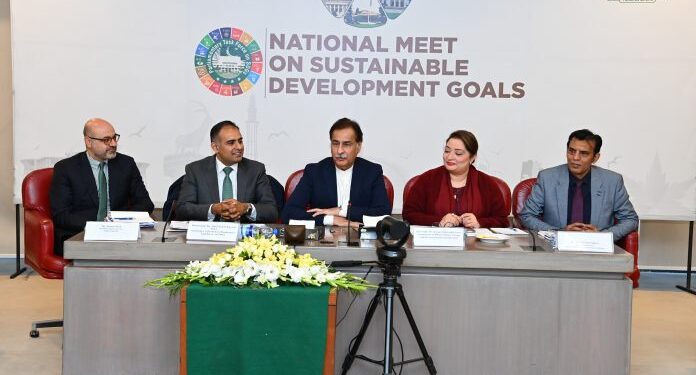National Assembly Speaker Sardar Ayaz Sadiq emphasized the importance of both global and domestic recognition of Pakistan’s efforts, highlighting that the United Nations, China, and other nations have acknowledged the country’s dedication to the Sustainable Development Goals (SDGs).
During the National meet on SDGs, organized by the SDGs Secretariat with policymakers, international organizations, and provincial representatives, he stressed the need for expanding efforts at the provincial level to accelerate Pakistan’s progress on the 2030 agenda.
“We have received recognition from the UN, China, and other countries for our commitment to the SDGs. Now, it is time to expand these efforts at the provincial level,” he stated.
The meeting focused on Pakistan’s unique challenges, such as climate vulnerability, economic instability, and gender inequality, while also emphasizing the country’s ongoing efforts to align development policies with global SDG priorities.
Bilal Azhar Kayani, Convener of the SDGs Parliamentary Taskforce, recalled Pakistan’s milestone as the first country to create a dedicated parliamentary body for SDGs. He stressed that political commitment is crucial to overcoming development challenges and achieving the targets.
Marriyum Aurangzeb, Senior Minister for Environment and Climate Change in Punjab, presented the province’s Climate Resilience and Clean Air Action Plan, which includes a Green Master Plan for Lahore and a special force to tackle smog. “Our focus on low-carbon development and reducing polluted air days is already showing results,” she noted.
Dr. Abid Qaiyum Suleri, Executive Director of the Sustainable Development Policy Institute (SDPI), highlighted the disproportionate effects of climate change on Pakistan. Despite contributing less than 1% of global greenhouse gas emissions, Pakistan faces major challenges from erratic monsoon patterns, glacial melt, and rising sea levels.
Suleri commended Pakistan’s efforts at COP27, where it successfully advocated for the creation of the Loss and Damage Fund, although it remains inactive. He called for increased climate financing and emphasized that the largest polluters must take responsibility for climate justice.
The country’s economic challenges, worsened by a heavy debt burden, limit its capacity to fund sustainable development initiatives. Dr. Suleri mentioned that Pakistan requires approximately $14 billion to meet its Nationally Determined Contributions (NDCs) and must navigate complex global financing mechanisms.
Dr. Samuel Rizk, UNDP’s Resident Representative in Pakistan, stressed the urgency of addressing critical issues such as hunger, quality education, and health. He pointed out that with just five years left, swift and decisive action is necessary to achieve the SDGs.
Despite progress in certain areas, Rizk noted that Pakistan ranks 145th out of 146 countries on the gender gap index. “Integrating women into the workforce is essential for economic growth,” he said, adding that with 60% of the population under 30, there is a significant opportunity for investment and innovation.
Related Posts

















